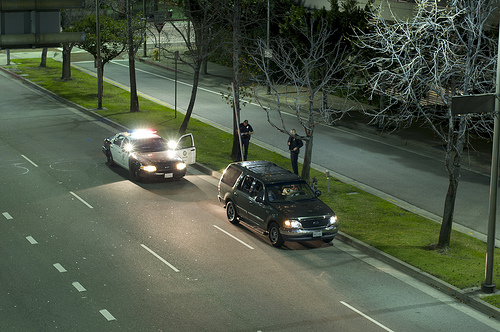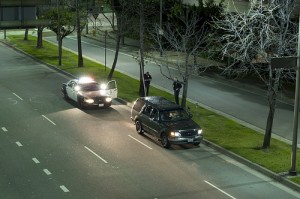






Colorado Traffic Stops and Questioning – Do You Have To Answer Colorado Police Questions?
Colorado Traffic Stops and Questioning by Colorado Criminal Defense Lawyer – Attorney H. Michael Steinberg
Colorado traffic stops and subsequent questioning of the driver seem to always begin the same way – “driver’s license, registration and proof of insurance sir” ..
After you produce these items – then what? What rights follow? What rights are limited by the circumstances and the law? That is the subject of this article.
When Can Colorado Law Enforcement Demand Identification?
There are two clear events that require carrying and producing your Colorado ID .. they are:
(1) if you are driving a vehicle and you are stopped by the police.
(2) you are passenger on a commercial airline.
Non – Automobile Cases Police Contacts and Identification
The United States Supreme Court – in Hiibel v. Sixth Judicial District Court of Nevada, upheld state laws requiring citizens to reveal their identity when officers have reasonable suspicion to believe criminal activity may have taken place. Commonly known as “stop-and-identify” statutes, these laws permit police to arrest criminal suspects who refuse to identify themselves.
As of 2012, 24 states had stop-and-identify laws.
Here is the law in Colorado:
§ 16-3-103. Stopping of suspect
(1) A peace officer may stop any person who he reasonably suspects is committing, has committed, or is about to commit a crime and may require him to give his name and address, identification if available, and an explanation of his actions. A peace officer shall not require any person who is stopped pursuant to this section to produce or divulge such person’s social security number. The stopping shall not constitute an arrest.
(2) When a peace officer has stopped a person for questioning pursuant to this section and reasonably suspects that his personal safety requires it, he may conduct a pat-down search of that person for weapons.
Colorado Traffic Stops and Questioning
Notwithstanding this law – the police can never compel you to identify yourself without reasonable suspicion to believe you have been involved in illegal activity.
To determine if the police officer asking to identify has reasonable suspicion to detain you further, you may ask the officer, “Excuse me officer. Are you detaining me, or am I free to go?”
If the officer says that you are free to go, leave immediately and don’t answer any more questions.
If the officer has decided to detain you, it is my advice that refusing to identify yourself is NOT worth the possibility of arrest or a possible prolonged detention. Furthermore, in matters of mistaken identity, revealing who you are might actually help to resolve the situation quickly.
Are Miranda Warnings Required Stop and Identify Cases?
The Colorado courts have ruled that Miranda warnings are not required during stops. Normally, the first few questions a police officer will ask a suspect concern his identify. If you refuse to provide your name and/or address or the police have reasonable doubts whether the name or address you provide is correct, the law permits the officer to request you to produce identification.
If you refuse, the officer cannot order you to give your ID to him or to go into your pockets for that identification. The failure to identify yourself to a police officer’s satisfaction is not in itself a crime. There is no Colorado law that requires a person to produce his driver’s license for identification purposes if you are not operating a vehicle. See C.R.S. 16-3-103 for a more comprehensive article on this subject.
Compare Colorado Traffic Stops and Demanding Identification Information
In traffic cases, C.R.S. 42-2-115 requires that an driver operator display his driver’s license upon demand by a peace officer who reasonably suspects that the operator is committing, has committed, or is about to commit a violation of article 2, 3, 4, 5, 6, 7, or 8 of title 42 – the Colorado Traffic Code.
Here is the Law In Colorado – C.R.S. 42-2-115:
§ 42-2-115. License, permit, or identification card to be exhibited on demand
(1) No person who has been issued a driver’s or minor driver’s license or an instruction permit or an identification card as defined in section 42-2-301(2), who operates a motor vehicle in this state, and who has such license, permit, or identification card in such person’s immediate possession shall refuse to remove such license, permit, or identification card from any billfold, purse, cover, or other container and to hand the same to any peace officer who has requested such person to do so if such peace officer reasonably suspects that such person is committing, has committed, or is about to commit a violation of article 2, 3, 4, 5, 6, 7, or 8 of this title.
(2) Any person who violates any provision of this section commits a class 2 misdemeanor traffic offense.
Can The Officer Search You For Identification? – An Unanswered Question
An unanswered question is whether an officer may retrieve a wallet (visible as a bulge) from the pocket of a stopped suspect who denies having any identification “available.” Some jurisdictions have permitted this, while others have condemned this practice. There are no Colorado court cases on this point.
An officer who feels he or she is receiving contradictory or evasive answers to identity questions may assert in court that this type of response strengthens the officer’s suspicions and therefore justifies a longer detention period to attempt to verify the suspect’s identity.
Courts in Colorado have ruled that “lengthy” detentions do not necessarily become arrests as long as the officer is diligently trying to verify the suspect’s identity…. but where a police officer has exhausted alternate identification sources, he must let you leave unless you have probable cause to arrest.
What About Other Scenarios – Colorado Stops Based on Reasonable Suspicion
When a police officer believes he is preventing the commission of a crime or are investigating a crime he believes is being committed, his questions focus on where the suspect is coming from, where he is going, and what he is doing. YOU DO NOT HAVE TO ANSWER ANY OF THESE QUESTIONS.
Voluntariness and Your Miranda Rights Kick In – Lengthy Detention and Focused Questioning
If a police officer’s suspicions are heightened by your refusal to answer questions, and you have not been released and are being detained – the Fifth Amendment’s prohibition under the Miranda case are implicated.
Once the police officer’s questioning moves beyond brief threshold inquiries, you are at a point at which the suspect’s Fifth Amendment right to silence becomes an issue. Here the questioning may be more sustained, focused and insistent, it focuses on the suspect as the perpetrator of a crime, and its purpose is to obtain incriminating statements from the suspect.
Now, the officer will attempt to make sure that your answers (if you reject my advice and are answering his or her questions) are being given voluntarily. The officer may now tell you that you do not need to answer his questions, and he may also tell you that you are NOT under arrest.
You should always – during this type of questioning – make clear you do not want to answer his questions, and ask to stop your interrogation.
Your demand to remain silent cannot be used as a factor to support either reasonable suspicion or probable cause.
Miranda Is Clearer When.. Custodial Interrogation Emerges
If the officer begins to intensify the interrogation – and it is clear you are not free to leave,
– the questioning is intense and insistent
– there may be more than one officer involved in the questioning, and
– the purpose is clearly is to elicit some type of incriminating statement or confession or other crucial information from him that would lead to an arrest, Miranda will more likely apply.
This may not be a formal arrest, but it can amount to the kind of “custodial interrogation” situation where the Judge may later find required a “full advisement” of the Miranda warnings.
Coerced Confession or Miranda Rights Violation – The Fruit of the Poisonous Tree Doctrine In Colorado
While an invalid stop or arrest does not automatically require suppression of evidence obtained thereafter, in a well known Colorado Supreme Court case – the Court stated:
“[Not all evidence is ‘fruit of the poisonous tree’ simply because it would not have come to light but for the illegal actions of the police. If the evidence to which the objection is made has been produced by exploitation of the initial illegal police action, the evidence is tainted and inadmissible….
Please call our law firm if you have questions about ..
Colorado Traffic Stops and Questioning
H. Michael Steinberg has been a Colorado criminal law specialist attorney for 40 years (as of 2012). For the First 13 years of his career, he was an Arapahoe – Douglas County District Attorney Senior prosecutor. In 1999 he formed his own law firm for the defense of Colorado criminal cases.
In addition to handling tens of thousands of cases in the trial courts of Colorado, he has written hundreds of articles regarding the practice of Colorado criminal law and frequently provides legal analysis on radio and television, appearing on the Fox News Channel, CNN and Various National and Local Newspapers and Radio Stations. Please call him at your convenience at 720-220-2277
If you have questions about Colorado Traffic Stops and Questioning in the Denver metropolitan area and throughout Colorado, attorney H. Michael Steinberg will be pleased to answer those questions and to provides quality legal representation to those charged in Colorado adult and juvenile criminal matters.
In the Denver metropolitan area and throughout Colorado, attorney H. Michael Steinberg provides quality legal representation to those charged in Colorado adult and juvenile criminal matters…as regards Colorado Traffic Stops and Questioning.

Other Articles of Interest:
- Colorado DUI Stops – Knowing Your Rights – Being Smart
- Understanding Arrest, Custody and “Investigative Detentions” General Principles
- If You Are Arrested In Colorado
- Colorado State DUI and Traffic Criminal Issues
- Colorado Criminal Law – Auto Stops – Drug Dogs – Smell Of Marijuana – And Searches of Your Car























